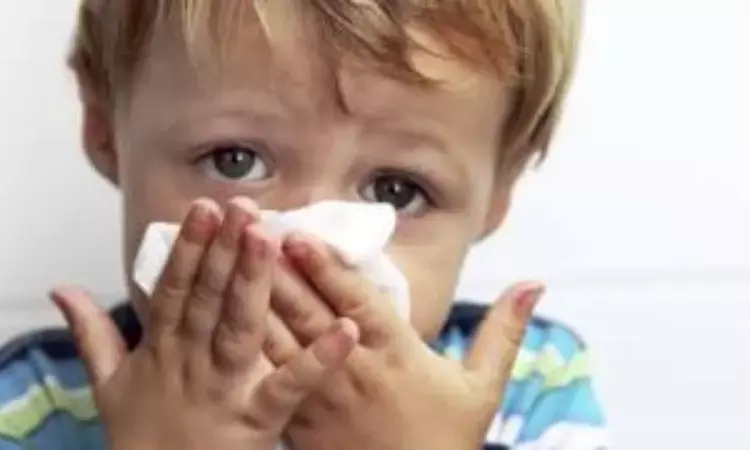- Home
- Medical news & Guidelines
- Anesthesiology
- Cardiology and CTVS
- Critical Care
- Dentistry
- Dermatology
- Diabetes and Endocrinology
- ENT
- Gastroenterology
- Medicine
- Nephrology
- Neurology
- Obstretics-Gynaecology
- Oncology
- Ophthalmology
- Orthopaedics
- Pediatrics-Neonatology
- Psychiatry
- Pulmonology
- Radiology
- Surgery
- Urology
- Laboratory Medicine
- Diet
- Nursing
- Paramedical
- Physiotherapy
- Health news
- Fact Check
- Bone Health Fact Check
- Brain Health Fact Check
- Cancer Related Fact Check
- Child Care Fact Check
- Dental and oral health fact check
- Diabetes and metabolic health fact check
- Diet and Nutrition Fact Check
- Eye and ENT Care Fact Check
- Fitness fact check
- Gut health fact check
- Heart health fact check
- Kidney health fact check
- Medical education fact check
- Men's health fact check
- Respiratory fact check
- Skin and hair care fact check
- Vaccine and Immunization fact check
- Women's health fact check
- AYUSH
- State News
- Andaman and Nicobar Islands
- Andhra Pradesh
- Arunachal Pradesh
- Assam
- Bihar
- Chandigarh
- Chattisgarh
- Dadra and Nagar Haveli
- Daman and Diu
- Delhi
- Goa
- Gujarat
- Haryana
- Himachal Pradesh
- Jammu & Kashmir
- Jharkhand
- Karnataka
- Kerala
- Ladakh
- Lakshadweep
- Madhya Pradesh
- Maharashtra
- Manipur
- Meghalaya
- Mizoram
- Nagaland
- Odisha
- Puducherry
- Punjab
- Rajasthan
- Sikkim
- Tamil Nadu
- Telangana
- Tripura
- Uttar Pradesh
- Uttrakhand
- West Bengal
- Medical Education
- Industry
Childhood Respiratory Conditions Linked to Adult Chronic Rhinosinusitis, suggests study

The researchers have established respiratory conditions in childhood, with frequent head colds, tonsillitis, and asthma, as key independent predictors for the incidence of chronic rhinosinusitis in middle age. In this respect, a study published by Jennifer L. and colleagues in the journal Allergy has added important information on how respiratory problems in early life predispose toward Chronic rhinosinusitis (CRS) later in life and establishes the need for early intervention and careful monitoring.
CRS is a chronic inflammatory condition of the sinuses that significantly affects the quality of life of millions of individuals worldwide, generally with symptoms of nasal obstruction and facial pain. Although very common, the risk factors related to early life in the development of adult CRS are not so well understood. For example, the Tasmanian Longitudinal Health Study provides an exemplary cohort initiated in 1968 for investigating life course associations.
This study particularly examined the relationships between childhood conditions of respiratory infections and allergies and the incidence of CRS in middle age. It also took into consideration asthma and allergies during the course and their impact on the risk of CRS.
In this study, the included participants of the TAHS cohort were first studied in 1968 at age 6-7 years (n = 8583) and followed into middle age (n = 3609). At age 53, participants were categorized into CRS severity subtypes: no sinusitis/CRS, past doctor diagnosis only, current symptoms without doctor diagnosis, and doctor-diagnosed CRS with current symptoms. Using multinomial regression, it examined associations with childhood respiratory conditions and previously published asthma-allergy trajectories from ages 7 to 53 years.
In middle age, 5.8% of participants reported current CRS symptoms, with 2.5% having a doctor diagnosis. Significant childhood conditions associated with symptomatic doctor-diagnosed CRS included:
• Frequent head colds: mOR = 2.04 (95% CI: 1.24, 3.37)
• Frequent tonsillitis: mOR = 1.61 (95% CI: 1.00, 2.59)
• Current childhood asthma: mOR = 2.23 (95% CI: 1.25, 3.98)
Life course trajectories with late-onset or persistent asthma and allergies were associated with all CRS subtypes in middle age. Notably, early-onset persistent asthma and allergies had a significant association with symptomatic doctor-diagnosed CRS:
• Early-onset persistent asthma and allergies: mOR = 6.74 (95% CI: 2.76, 16.4)
• Late-onset asthma allergies: mOR = 15.9 (95% CI: 8.06, 31.4)
• Late-onset hayfever: mOR = 3.02 (95% CI: 1.51, 6.06)
These findings indicate that children who have frequent respiratory infections and asthma run a higher risk of contacting CRS at middle age. The research puts forth the importance of very early and active management of respiratory conditions in childhood, which probably would reduce the risk of CRS at old age. Persistent and late-onset asthma and allergies are robust predictors for adult CRS, underpinning their interrelationship across the life course.
The current asthma, frequent head colds, and tonsillitis at age 7 are indicators of a higher risk for CRS in mid-adult life. These results call for close follow-up and early interventions on childhood respiratory morbidity in order to reduce long-term risks. Concomitant asthma and allergy are treatable traits whose management in childhood may lighten the burden of CRS in adulthood.
Reference:
Perret, J. L., Idrose, N. S., Walters, E. H., Bui, D. S., Lowe, A. J., Lodge, C. J., Fernandez, A. R., Yao, V., Feather, I., Zeng, X.-W., Thompson, B. R., Erbas, B., Abramson, M. J., & Dharmage, S. C. (2024). Childhood infections, asthma and allergy trajectories, and chronic rhinosinusitis in middle age: A prospective cohort study across six decades. Allergy. https://doi.org/10.1111/all.16184
Dr Riya Dave has completed dentistry from Gujarat University in 2022. She is a dentist and accomplished medical and scientific writer known for her commitment to bridging the gap between clinical expertise and accessible healthcare information. She has been actively involved in writing blogs related to health and wellness.
Dr Kamal Kant Kohli-MBBS, DTCD- a chest specialist with more than 30 years of practice and a flair for writing clinical articles, Dr Kamal Kant Kohli joined Medical Dialogues as a Chief Editor of Medical News. Besides writing articles, as an editor, he proofreads and verifies all the medical content published on Medical Dialogues including those coming from journals, studies,medical conferences,guidelines etc. Email: drkohli@medicaldialogues.in. Contact no. 011-43720751


